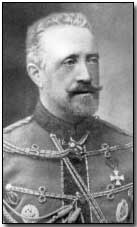Who's Who - Grand Duke Nikolai
 Grand Duke Nikolai Nikolaevich
(1856-1929) was Commander in Chief of the Russian army during the first year
of the First World War and, for the briefest moment, at the end of Tsar
Nicholas II's
reign.
Grand Duke Nikolai Nikolaevich
(1856-1929) was Commander in Chief of the Russian army during the first year
of the First World War and, for the briefest moment, at the end of Tsar
Nicholas II's
reign.
The Grand Duke was possessed of a distinguished military background. He was educated at the General Staff Academy before being receiving his commission in 1872. He served thereafter in the Russo-Turkish War of 1877-78 and was inspector general of the cavalry for ten years from 1895, during which time he introduced a series of notable reforms in their training. In 1905 he was made commander of the St. Petersburg military district.
Appointed to command of the army with the onset of war in August 1914 - the Tsar having abandoned the notion of personally leading his forces - the Grand Duke (coincidentally the Tsar's uncle) found himself handicapped by the Russian army's appalling system of communications. Once his commanders were dispatched to the field he had little further control over their actions, although he remained publicly (and officially) responsible for their consequences.
Early successes in East Prussia proved to be an aberration; the combined force of Paul von Hindenburg (dug out of retirement) and Erich Ludendorff swept the Russian army out of East Prussia in fairly short order and included the disastrous defeat at Tannenberg (where army commander Samsonov committed suicide rather than face the Tsar in defeat).
Similarly, early success in Galicia against the hapless Austro-Hungarians were more than reversed by the entry of the Germans into the arena. The German breakthrough as Gorlice-Tarnow in May 1915 resulted in huge Russian casualties and virtually ejected the Russians from Poland.
The Tsarina, Alexandra, who in any event mistrusted the Grand Duke's popular reputation, lobbied her husband to relieve him of his role as Commander in Chief. Against the advice of his cabinet the Tsar did so and (more to their concern) assumed command of the army himself.
The Grand Duke was consequently dispatched to the Caucasian front and made Commander in Chief of Russian forces in the region already operating most successfully under the direction of Nikolai Yudenich.
Remaining largely passive while the subordinated Yudenich continued his impressive run of victories against the Turkish forces, he nevertheless played a notable role in first recommending constitutional reform upon the Tsar and then (once this had patently failed) in finally recommending abdication following the February Revolution.
The Tsar's last official act was to re-appoint the Grand Duke as Commander in Chief, an action that was promptly rescinded by Prince Georgy Lvov, the head of the Provisional Government.
Dismissed by the Provisional Government he remained in the Crimea until his departure on a British warship to exile in Italy and France in March 1919, where he placed himself at the head of an organisation seeking to unite anti-communist émigrés.
He died on 5 January 1929 at Antibes, France, aged 72.
Stormtroopers comprised specially trained German assault troops used in 1918.
- Did you know?
